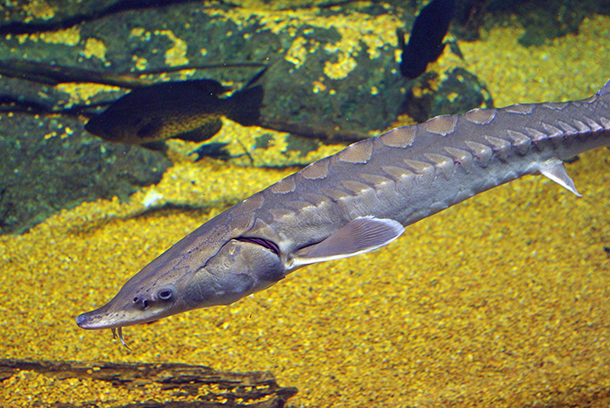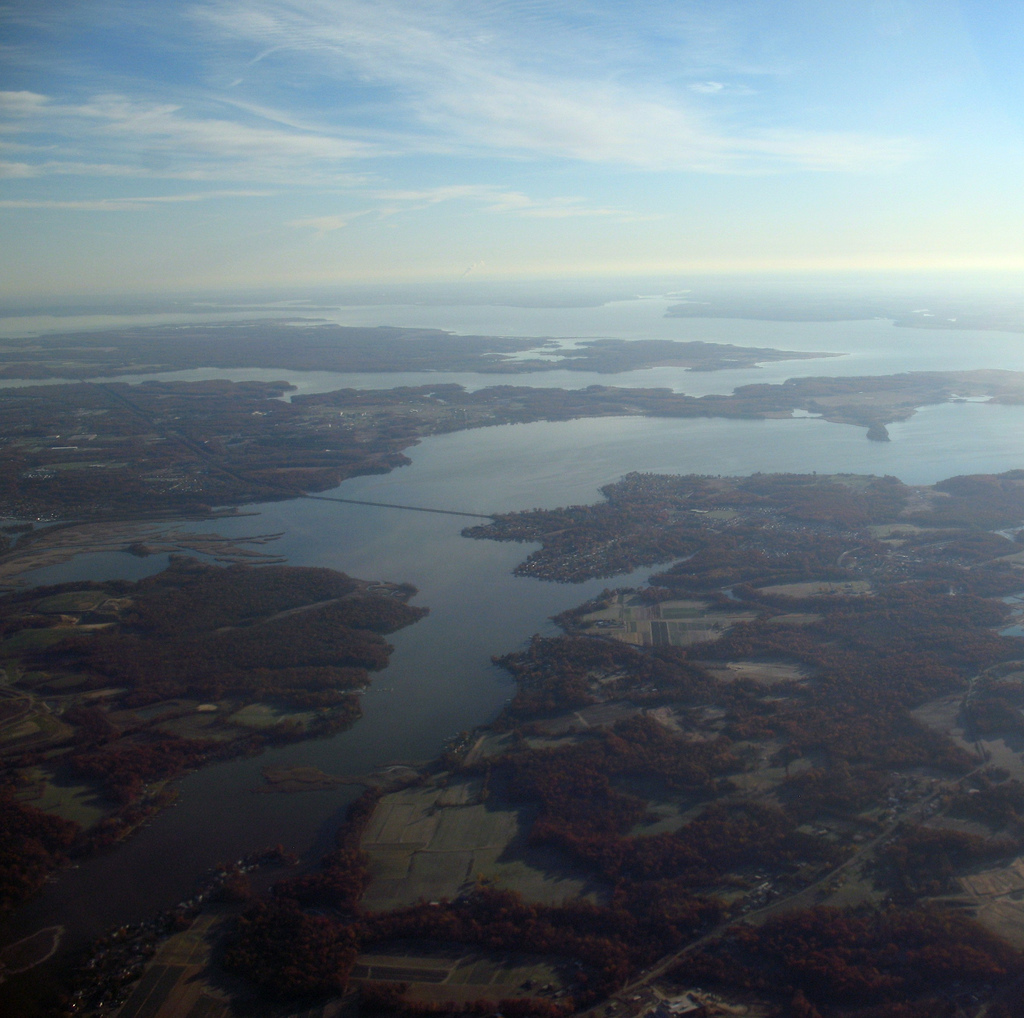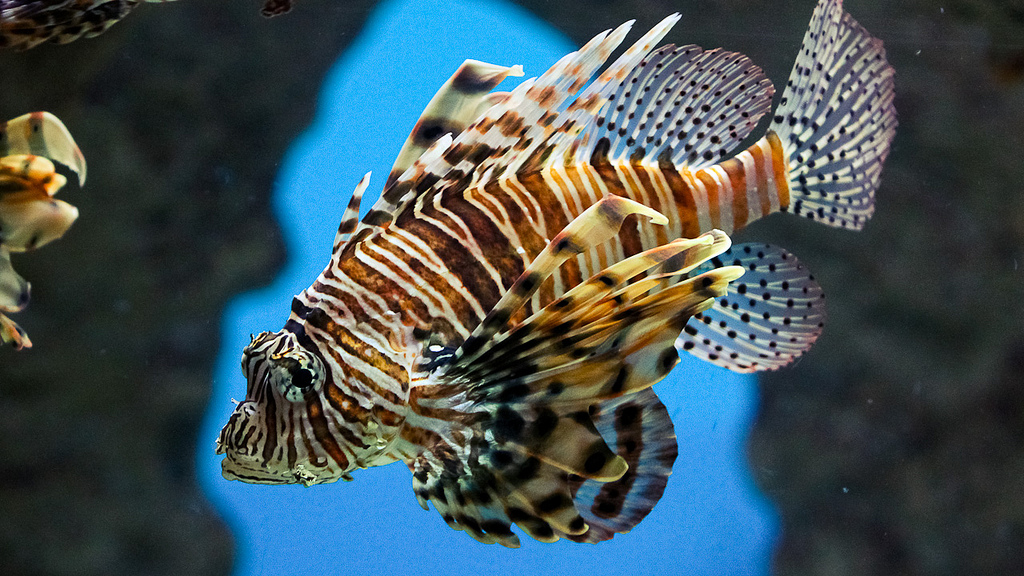Beyond the Headlines
Air Date: Week of October 3, 2014

An Atlantic Sturgeon. (Photo: Vastateparkstaff; Flickr CC)
In this week’s trip beyond the headlines, Peter Dykstra tells host Steve Curwood about an ugly prehistoric fish making a comeback, a prettier but invasive fish with a ferocious appetite and a conference where the Ford Motor Company and GreenPeace were on the same page.
Transcript
CURWOOD: We’re off now to explore beyond the headlines in the company of Peter Dykstra. He’s the publisher of Environmental Health News, that’s EHN.org, and TheDailyClimate.org, and our perennial guide to telling stories that shouldn’t be missed. He’s on the line from Conyers, Georgia. Hi, Peter.
DYKSTRA: Hi, Steve. One of the nicknames they give to the state of Maryland is “The Land of Pleasant Living,” and the Chesapeake Bay is one of the reasons it’s always been pleasant. But we’ve known for decades that the Bay is in trouble from industrial pollution, and farm runoff, from urban growth and a whole list of other things. Well, Darryl Fears of the Washington Post found a little good news for the Bay: Sturgeon are coming back.
CURWOOD: Well, covering the environment, we never turn away good news, so tell us more.
DYKSTRA: Atlantic sturgeon are big, majestic, ancient, endangered, and in my opinion, remarkably ugly anadromous fish.
CURWOOD: Anadromous, meaning they split their time between saltwater and freshwater, which they’ve been doing for almost 200 million years.

The northern part of the Chesapeake Bay, where Atlantic Sturgeon are making a comeback. (Photo: Bossi; Flickr CC)
DYKSTRA: Right, but pollution and the building of dams have made it hard for sturgeon to get back to their freshwater spawning grounds. Scientists had pretty much given up on finding sturgeon in the Chesapeake, but fishermen said they kept spotting them. And this summer a five-foot-long sturgeon literally jumped into a boat, inspiring a science safari that netted eight more sturgeon, giving hope that this big ugly fish survives in the Chesapeake.
CURWOOD: Well, that’s a good sign for the Bay, but I gather its problems are far from over.
DYKSTRA: To be sure. Parts of six states drain their rivers and their farm runoff, into the Chesapeake Bay; its cleanup is still a long way off. The striped bass there may be in decline. The iconic crab and oyster fisheries aren’t what they once were, and the combination of sea-level rise, erosion, and the fact that the Bay’s wetlands are naturally sinking, is a daunting combination of challenges. But the sturgeon brings us a ray of hope. Are you ready for another fish tale?
CURWOOD: OK, I’ll bite.

The lionfish is a poisonous invasive species. (Photo: Tim Wang; Flickr CC)
DYKSTRA: Alright, from the same part of the world, the US East Coast, where the Lionfish is taking over. Lionfish are sort of the anti-sturgeon: They’re smaller. I think they’re really pretty, and instead of an ancient fixture, they’re a newcomer.
CURWOOD: Yeah, aren’t they an invader species from the tropics?
DYKSTRA: The tropics on the other side of the globe, but they’ve made it to the Atlantic, and our friends at the Climate News Network – that’s a great nonprofit based in the UK, where they’re the other CNN – reported that they’re making their way up the Atlantic Coast as waters there get warmer. Lionfish are voracious eaters; they tend to nearly wipe out reef-fish populations wherever they show up, which now is as far north as the Carolina coast. Lionfish are said to be good to eat, but they’re not so good to catch. Their venomous spines can cause big problems for divers or fishermen.

The notorious (and short-lived) Ford Excursion. (Photo: David Guo; Flickr CC)
CURWOOD: So, pretty but painful. Let’s move on to our weekly stroll through environmental history, Peter.
DYKSTRA: Sure, it was a new day, back on October 5th, 2000, when the Chairman of one of the Big Three auto companies, a scion of the Ford Family itself, strode to the podium of a London business conference – a business conference organized by Greenpeace, and Greenpeace and Big Business agreed there.
CURWOOD: Huh, I guess you’re talking about Bill Ford?
DYKSTRA: The same, of the Ford Motor Company, Henry Ford’s great grandson. He told the gathering that climate change was a big deal, a game changer, and that Ford would lead the way for the auto industry to clean up.
CURWOOD: And did they?
DYKSTRA: Well, maybe yes, maybe no. That day, Bill Ford also announced that his company was quitting the Global Climate Coalition—that was the climate-denying club of the day. But that same year, Ford launched the Excursion, its biggest, baddest SUV; it slurped a gallon of fuel for every twelve miles it drove. The Excursion won affectionate nicknames from environmentalists like the “Ford Valdez” and the “Suburban Assault Vehicle.”
CURWOOD: And as I recall, the Excursion was big while it lasted, but it wasn’t around for very long.
DYKSTRA: It was ginormous while it lasted—19 feet long, weighing in at four tons. But the Ford Excursion was discontinued in 2005, and Ford Motor’s track record has been all over the map ever since. Progress? Even their lead SUV, the Expedition, can get up to 22 miles a gallon. They’ve got a line of hybrids and Electric Vehicles, maybe not as well-marketed or successful as Toyota’s Prius or the Chevy Volt, but according to a report by the advocacy group Forecast the Facts, Ford has also fueled climate denial groups to the tune almost $800,000 dollars in recent years. Bill Ford is still the Executive Chairman of Ford Motor, but they may have put a muffler on him.
CURWOOD: Peter Dykstra is the publisher of Eenvironmental Health News, that ehn.org, and The Daily Climate.org. Thanks for the update, Peter.
DYKSTRA: Alright, Steve, thanks a lot. We'll talk to you soon.
CURWOOD: And there’s more on these stories at LOE.org.
Links
The lionfish’s advance, as told by the Daily Climate
Living on Earth wants to hear from you!
Living on Earth
62 Calef Highway, Suite 212
Lee, NH 03861
Telephone: 617-287-4121
E-mail: comments@loe.org
Newsletter [Click here]
Donate to Living on Earth!
Living on Earth is an independent media program and relies entirely on contributions from listeners and institutions supporting public service. Please donate now to preserve an independent environmental voice.
NewsletterLiving on Earth offers a weekly delivery of the show's rundown to your mailbox. Sign up for our newsletter today!
 Sailors For The Sea: Be the change you want to sea.
Sailors For The Sea: Be the change you want to sea.
 The Grantham Foundation for the Protection of the Environment: Committed to protecting and improving the health of the global environment.
The Grantham Foundation for the Protection of the Environment: Committed to protecting and improving the health of the global environment.
 Contribute to Living on Earth and receive, as our gift to you, an archival print of one of Mark Seth Lender's extraordinary wildlife photographs. Follow the link to see Mark's current collection of photographs.
Contribute to Living on Earth and receive, as our gift to you, an archival print of one of Mark Seth Lender's extraordinary wildlife photographs. Follow the link to see Mark's current collection of photographs.
 Buy a signed copy of Mark Seth Lender's book Smeagull the Seagull & support Living on Earth
Buy a signed copy of Mark Seth Lender's book Smeagull the Seagull & support Living on Earth

